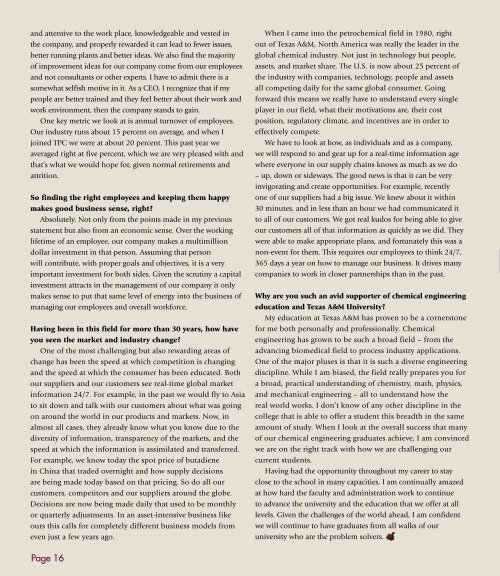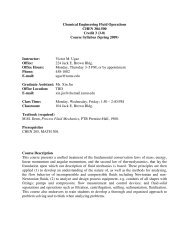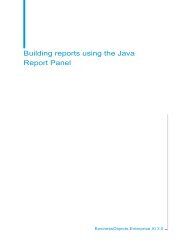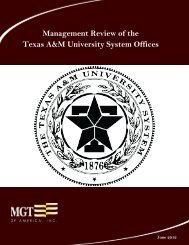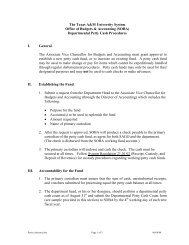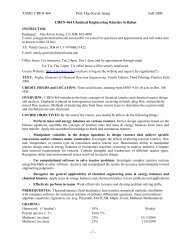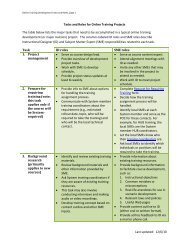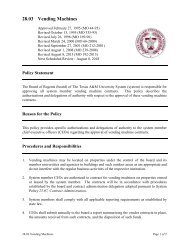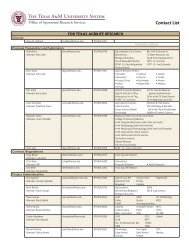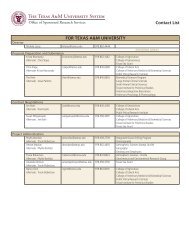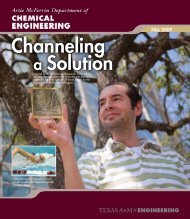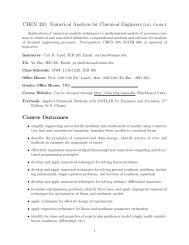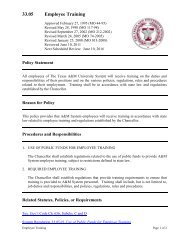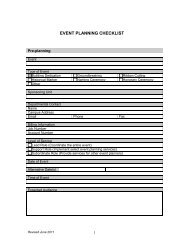Spring 2011 - Department of Chemical Engineering - Texas A&M ...
Spring 2011 - Department of Chemical Engineering - Texas A&M ...
Spring 2011 - Department of Chemical Engineering - Texas A&M ...
You also want an ePaper? Increase the reach of your titles
YUMPU automatically turns print PDFs into web optimized ePapers that Google loves.
and attentive to the work place, knowledgeable and vested in<br />
the company, and properly rewarded it can lead to fewer issues,<br />
better running plants and better ideas. We also find the majority<br />
<strong>of</strong> improvement ideas for our company come from our employees<br />
and not consultants or other experts. I have to admit there is a<br />
somewhat selfish motive in it. As a CEO, I recognize that if my<br />
people are better trained and they feel better about their work and<br />
work environment, then the company stands to gain.<br />
One key metric we look at is annual turnover <strong>of</strong> employees.<br />
Our industry runs about 15 percent on average, and when I<br />
joined TPC we were at about 20 percent. This past year we<br />
averaged right at five percent, which we are very pleased with and<br />
that’s what we would hope for, given normal retirements and<br />
attrition.<br />
So finding the right employees and keeping them happy<br />
makes good business sense, right?<br />
Absolutely. Not only from the points made in my previous<br />
statement but also from an economic sense. Over the working<br />
lifetime <strong>of</strong> an employee, our company makes a multimillion<br />
dollar investment in that person. Assuming that person<br />
will contribute, with proper goals and objectives, it is a very<br />
important investment for both sides. Given the scrutiny a capital<br />
investment attracts in the management <strong>of</strong> our company it only<br />
makes sense to put that same level <strong>of</strong> energy into the business <strong>of</strong><br />
managing our employees and overall workforce.<br />
Having been in this field for more than 30 years, how have<br />
you seen the market and industry change?<br />
One <strong>of</strong> the most challenging but also rewarding areas <strong>of</strong><br />
change has been the speed at which competition is changing<br />
and the speed at which the consumer has been educated. Both<br />
our suppliers and our customers see real-time global market<br />
information 24/7. For example, in the past we would fly to Asia<br />
to sit down and talk with our customers about what was going<br />
on around the world in our products and markets. Now, in<br />
almost all cases, they already know what you know due to the<br />
diversity <strong>of</strong> information, transparency <strong>of</strong> the markets, and the<br />
speed at which the information is assimilated and transferred.<br />
For example, we know today the spot price <strong>of</strong> butadiene<br />
in China that traded overnight and how supply decisions<br />
are being made today based on that pricing. So do all our<br />
customers, competitors and our suppliers around the globe.<br />
Decisions are now being made daily that used to be monthly<br />
or quarterly adjustments. In an asset-intensive business like<br />
ours this calls for completely different business models from<br />
even just a few years ago.<br />
Page 16<br />
When I came into the petrochemical field in 1980, right<br />
out <strong>of</strong> <strong>Texas</strong> A&M, North America was really the leader in the<br />
global chemical industry. Not just in technology but people,<br />
assets, and market share. The U.S. is now about 25 percent <strong>of</strong><br />
the industry with companies, technology, people and assets<br />
all competing daily for the same global consumer. Going<br />
forward this means we really have to understand every single<br />
player in our field, what their motivations are, their cost<br />
position, regulatory climate, and incentives are in order to<br />
effectively compete.<br />
We have to look at how, as individuals and as a company,<br />
we will respond to and gear up for a real-time information age<br />
where everyone in our supply chains knows as much as we do<br />
– up, down or sideways. The good news is that it can be very<br />
invigorating and create opportunities. For example, recently<br />
one <strong>of</strong> our suppliers had a big issue. We knew about it within<br />
30 minutes, and in less than an hour we had communicated it<br />
to all <strong>of</strong> our customers. We got real kudos for being able to give<br />
our customers all <strong>of</strong> that information as quickly as we did. They<br />
were able to make appropriate plans, and fortunately this was a<br />
non-event for them. This requires our employees to think 24/7,<br />
365 days a year on how to manage our business. It drives many<br />
companies to work in closer partnerships than in the past.<br />
Why are you such an avid supporter <strong>of</strong> chemical engineering<br />
education and <strong>Texas</strong> A&M University?<br />
My education at <strong>Texas</strong> A&M has proven to be a cornerstone<br />
for me both personally and pr<strong>of</strong>essionally. <strong>Chemical</strong><br />
engineering has grown to be such a broad field – from the<br />
advancing biomedical field to process industry applications.<br />
One <strong>of</strong> the major pluses is that it is such a diverse engineering<br />
discipline. While I am biased, the field really prepares you for<br />
a broad, practical understanding <strong>of</strong> chemistry, math, physics,<br />
and mechanical engineering – all to understand how the<br />
real world works. I don’t know <strong>of</strong> any other discipline in the<br />
college that is able to <strong>of</strong>fer a student this breadth in the same<br />
amount <strong>of</strong> study. When I look at the overall success that many<br />
<strong>of</strong> our chemical engineering graduates achieve, I am convinced<br />
we are on the right track with how we are challenging our<br />
current students.<br />
Having had the opportunity throughout my career to stay<br />
close to the school in many capacities, I am continually amazed<br />
at how hard the faculty and administration work to continue<br />
to advance the university and the education that we <strong>of</strong>fer at all<br />
levels. Given the challenges <strong>of</strong> the world ahead, I am confident<br />
we will continue to have graduates from all walks <strong>of</strong> our<br />
university who are the problem solvers.<br />
THANK YOU.<br />
The Artie McFerrin <strong>Department</strong> <strong>of</strong> <strong>Chemical</strong> <strong>Engineering</strong> thanks all <strong>of</strong> its supporters, including those<br />
friends <strong>of</strong> the department who contributed gifts in 2010.<br />
The Air Products Foundation<br />
Mr. Graham W. Bacon<br />
Mr. and Mrs. John P. Bailey<br />
Bechtel Group Foundation<br />
Ms. Cassie Hamlin<br />
BP Corporation North America Inc.<br />
Chevron<br />
Communities Foundation <strong>of</strong> <strong>Texas</strong> Inc.<br />
Compliance Strategies and Solutions Inc.<br />
ConocoPhillips<br />
Mr. and Mrs. Paul F. Deisler Jr.<br />
Mr. and Mrs. Rudy T. Dismuke<br />
The Dow <strong>Chemical</strong> Foundation<br />
Mr. and Mrs. Leonel D. Durbin<br />
Enterprise Products Partners LP<br />
Exxon Mobil Corporation<br />
Mr. and Mrs. Nicholas E. Gallopoulos<br />
The Gas Processors Association <strong>of</strong> Houston<br />
Mr. Juergen and Mrs. Mariah Hahn<br />
Ms. Kathryn Hanneman<br />
Mr. Frederick J. Hartensteiner<br />
Mr. and Mrs. Jack R. Hopper<br />
Ms. Suzanne Huebinger<br />
The Lubrizol Foundation<br />
Marathon Oil Company<br />
Mr. and Mrs. James F. Mathis<br />
Mr. Ray A. Mentzer<br />
Mr. Brock D. Nelson<br />
Mr. and Mrs. Ray B. Nesbitt<br />
Mr. and Mrs. Michael R. Niklasch<br />
Mr. and Mrs. Thomas Michael O’Connor<br />
Ms. Sheila R. Payne<br />
<strong>Chemical</strong> <strong>Engineering</strong> at <strong>Texas</strong> A&M University – Limitless Possibilities.<br />
Possibility. The very word, when spoken in the language <strong>of</strong> ingenuity and responsibility, is enough to inspire hope for a better<br />
tomorrow. Here at the Artie McFerrin <strong>Department</strong> <strong>of</strong> <strong>Chemical</strong> <strong>Engineering</strong>, we recognize that our faculty and students have the talent<br />
and potential to transform possibilities into realities and in doing so help make the world safer, cleaner, healthier and more efficient.<br />
With this in mind, we’re committed to <strong>of</strong>fering an educational environment ripe with possibilities and opportunities for our students.<br />
In the lab we’re pioneering new advances in important areas such as energy, health and the environment. In the classroom we’re<br />
consistently providing a world-class engineering education to our students that we believe will serve as a foundation for success<br />
throughout their lives.<br />
It’s an environment where an outstanding faculty engages in vital research while also inculcating the future leaders <strong>of</strong> our society<br />
with both the knowledge and values that define a <strong>Texas</strong> A&M University education. But cultivating such an environment demands<br />
resources. In short, we need your help.<br />
Indeed, many <strong>of</strong> our research and educational endeavors would not be possible without help from our former students and friends<br />
<strong>of</strong> the department. This support, when expressed in the form <strong>of</strong> undergraduate scholarships and graduate fellowships, enables young<br />
Aggie engineers to pursue their educational goals and ultimately become leaders in industry, academia and government. When<br />
channeled in the direction <strong>of</strong> faculty development and research, these contributions help us recruit and retain the best possible<br />
teachers and scholars, ensuring that many generations <strong>of</strong> students receive an outstanding education.<br />
However you choose to direct your gift, you can remain confident that your generosity will help us maintain<br />
excellence in chemical engineering at <strong>Texas</strong> A&M. This year, make a donation for chemical engineering<br />
through the <strong>Texas</strong> A&M Foundation. The Artie McFerrin <strong>Department</strong> <strong>of</strong> <strong>Chemical</strong> <strong>Engineering</strong> is<br />
committed to serving our state, nation and world, and with your support, the possibilities are truly limitless.<br />
Contact Andrew Acker, <strong>Chemical</strong> <strong>Engineering</strong> Development, <strong>Texas</strong> A&M Foundation<br />
979.458.4493, 979.324.2953 or a-acker@tamu.edu or visit www.giving.tamu.edu.<br />
Mr. and Mrs. Michael V. Pishko<br />
SABIC Americas Inc.<br />
Mr. Michael E. Sawyer<br />
Mr. Charles W. Shaver III<br />
Shell Oil Company Foundation<br />
Mr. Brandon T. Stone<br />
Mr. David C. Swienton<br />
Mr. and Mrs. Norman J. Tetlow<br />
Total Petrochemicals<br />
TPC Group<br />
Mrs. Donna Tromblee<br />
URS Energy and Construction Inc.<br />
Mr. and Mrs. Michael L. Walzel<br />
Wells Fargo Foundation<br />
Mr. and Mrs. Daniel H. Zivney<br />
Mr. Robert E. Zumwalt


